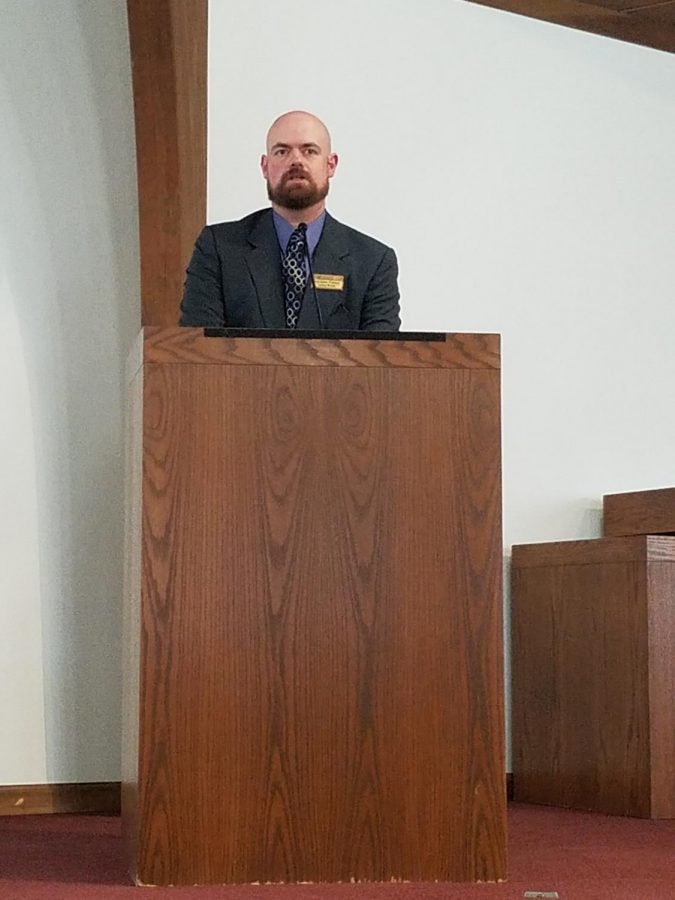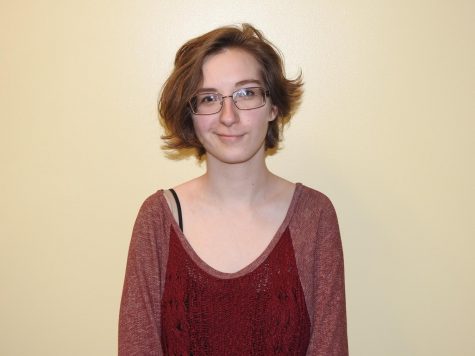Minister: Pray, but then be a change
Minister Brad Dayton urged those attending a memorial service Oct. 31 to act in love and support after a shooting Oct. 27.
November 7, 2018
Protestant Campus Minister Brad Dayton began a memorial service Oct. 31 with statements from victims’ friends and family members of the Tree of Life Synagogue shooting.
“Bernice and Sylvan Simon died together in the same synagogue where they were wed over 60 years ago,” Dayton read.
“The bride carried a Bible with white orchids and streamers, and her white dress was trimmed with lace,” Dayton continued. “They were the sweetest couple you could imagine.”
The Simons were two of 11 people killed Oct. 27 at the Tree of Life Synagogue in Pittsburgh’s Squirrel Hill neighborhood.
Also killed was Daniel Rosenthal, 54, whose daughter called him a simple man who did not require much. He and his brother Cecil, 59, similarly killed, were inseparable, Dayton read. They were the youngest of the 11 dead.
Joyce Feinberg, 75, worked as a Pitt-Oakland research specialist until 2008, Dayton read.
Rose Mallinger was spry, vibrant, and full of life, despite her 97 years. Her daughter Andrea was also injured in the shooting.
“She knew her children, her grandchildren, her great grandchildren better than anyone,” Dayton read.
After reading statements from friends and family humanizing those killed, Dayton led the 30 faculty, staff and students who attended the service in a prayer.
“We pray for those who act out in hate, God. We pray for them, that they would take a moment to stop and realize what they are doing.”
Junior Jed Elam played the piano softly while Protestant Campus Ministry frequenters read verses from the Old Testament. Seniors Sam Frey read Deuteronomy 6:5-7, Nick Marconi read Leviticus 19:18 and Emily Porter read Psalms 34:18.
Sophomore Minnie Jones then read “When All That’s Left of Me is Love” by Rabbi Allen Maller.
Dayton told the audience that, while it’s good to talk and pray about a tragedy, the real response must be more than just talk.
“It must lead to action.
“If we respond with vengeance and hate, it only begets more hate. Some people’s response is to sit and say nothing. We say ‘Yes, this is a tragedy,’ but then do nothing. Something needs to be fixed.”
He said that children must be taught to engage others with love instead of hate.
He noted Mahatma Gandhi’s famous words.
“We should be the change we want to see in the world—not just talk about it, not just praise other people for doing it, but be the change. Love people we disagree with, love people we perceive as enemies. The real change has to start there.”
Psychology professor Steven Stern said, a few years ago, he helped restart a Pitt-Johnstown Jewish Students Association, and he still maintains the group’s Facebook page.
Stern said that some people may be scared to make suggestions as to how change can be made, as it may be seen as divisive instead of unifying. One thing that can be done easily, however, he said, was to keep one’s ears open.
“This man was hateful on social media,” he said, but since there’s an abundance of hate, people don’t respond or can’t assess the threat.
“We feel like we have to ignore when people are hateful and wait until they kill someone. We have to be more observant and listen—that could save lives.”
Stern mentioned that if it were a mental health issue, then, by all means, people with a mental illness should be better cared for. If it were a gun issue, then he questioned whether unfettered access would be beneficial.
“We have to wave off extreme positions and consider things that might actually make a difference without taking offense, which can be hard,” Stern said.
“Jews sometimes try to live by Tikkum Olam, which means ‘repair the world.’ We believe that we all need to be here together.”
He noted the poem read at the memorial, which he attended, and the kindness and charity mentioned therein.
“The Jewish way of life puts more of a focus on what we do here and now over the rewards we get in an afterlife,” he said.
English literature professor Cathy Cox said some students may be unnerved because they may not be able to identify or cope with the wave of emotions following a shooting close to home.
“There’s been an increase in anti-Semitism recently, but nothing on this scale,” Cox said. She said that the Jewish community has been a convenient scapegoat group
Any activity or presentation that gives people a sense of community is best in this time of need, she said.
Cox said that a “Show up for Shabbat” campaign urged people to attend last Friday’s service.
“Even people who don’t go to service are going to show up,” she said.
“We’re not afraid to show up to our synagogues and temples. We’re not afraid to be seen as Jewish.
“I think we can always minimize hate with the goodwill of decent people. It matters, I think it does matter.”


